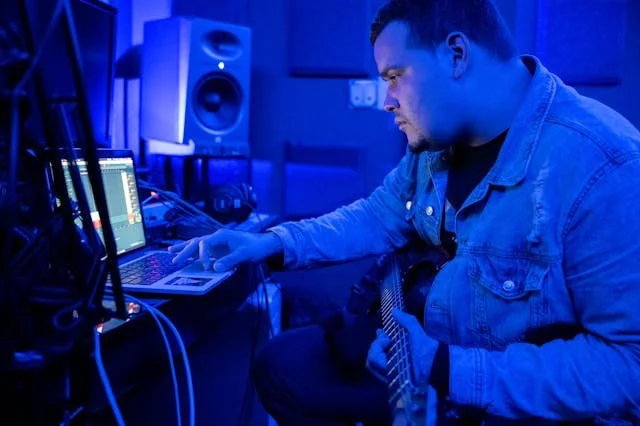20 Essential Tools for Success in the Music Industry
Photo Credit: Brett Sayles
The music industry has undergone a seismic shift in recent years. Gone are the days of relying solely on traditional recording studios and limited distribution channels. Today's artists and producers need to be armed with a digital arsenal to not only create great music but also navigate the ever-evolving landscape of establishing a fanbase and building a sustainable career.
Elevating the Creative Process
At the heart of artistic expression lies the creative spark, but the journey from a brainstorm to a finished track has been revolutionized by digital tools. Digital Audio Workstations (DAWs) like Ableton Live, Logic Pro, and Soundation offer a vast sonic palette, and music creators can experiment with virtual instruments, sample libraries, and effects that were once confined to expensive studio equipment. This empowers them to explore new sonic territories, refine their sound, and express themselves in ways previously unimaginable even ten years ago.
Collaboration is another area where digital tools shine. Platforms like BeatConnect and BandLab allow geographically dispersed artists to work together in real-time, while creating a sense of community and cross-pollination of ideas. Additionally, online marketplaces provide access to talented session musicians and vocalists, expanding the creative possibilities for solo artists and producers.
Crafting a Professional Sound
The democratization of music production doesn't negate the importance of professional polish. Tools like plug-ins and virtual mixing consoles equip artists and producers with the ability to enhance the sound quality of their recordings. Mastering software like CloudBounce helps them achieve a commercially viable sound, ensuring their music competes on a level playing field with major-label releases.
Furthermore, online resources and communities offer a wealth of tutorials and training materials. Aspiring producers can learn essential skills like audio mixing, mastering, and sound design, empowering them to achieve professional results without relying on expensive studio sessions.
Reaching a Global Audience
The internet has transformed music distribution, empowering artists to bypass traditional gatekeepers. Platforms like Spotify, Apple Music, and Bandcamp provide direct access to a global audience. Artists can control their pricing, curate their online presence, and engage directly with fans.
Digital marketing tools like targeted social media marketing and email marketing platforms like GetResponse offer artists the ability to connect with their target audience and build a loyal fanbase. Analytics dashboards provide valuable insights into listener demographics and preferences, allowing artists to refine their approach and tailor their music to resonate with specific communities.
Building a Sustainable Career
The music industry is no longer a one-shot game. Artists need to be self-sufficient and entrepreneurial to carve out a sustainable career. Project management tools help them organize their workflow, set deadlines, and track progress.
Additionally, digital tools like Printify can facilitate merchandise sales, and crowdfunding platforms like Kickstarter and Patreon allow artists to directly solicit support from their fans, fostering a sense of community and providing financial resources to fund recording projects and tours.
The Human Touch: Tools Don't Replace Talent
While digital tools are essential, it's crucial to remember that they are simply that - tools. They augment and amplify talent, but do not replace it. Musicianship, songwriting skills, creativity, and a strong work ethic remain fundamental to success. The best use of these tools lies in serving the music creator's vision, and not the other way around.
The Takeaway: Embracing the Digital Landscape
The modern music industry offers an unparalleled level of opportunity for artists and producers. By embracing the right digital tools, artists can refine their craft, reach a global audience, and build a sustainable career. However, it's important to maintain a healthy balance, using these tools to augment their talents and create music that resonates with listeners. This new landscape demands both artistic vision and a strategic approach, and the music creators equipped with both will be the ones who truly thrive.
Here are NxtNow’s recommended tools for artists and music producers to utilize for success in the music industry —
Unchained Music (Music Distribution, Music Marketing/Promotion, Music Mastering, Spotify Playlisting)
Musicvertising (Spotify Playlisting, YouTube Promotion, Music Marketing/Promotion, Graphic Design, Video Creation)
SoundCampaign (Music Marketing/Promotion, Spotify Playlisting)
Thematic (Influencer Marketing)
Solo.to (Smart Links)
Ditto (Music Distribution, Music Marketing/Promotion, Funding)
SpaceLoud (Music Distribution, Music Marketing/Promotion, Influencer Marketing)
DropTrack (Music Marketing/Promotion, Spotify Playlisting)
Rise (Music Marketing/Promotion, Social Media Marketing)
Social Boost (Instagram Growth)
Playlist Promotion (Spotify Playlisting, YouTube Promotion)
Record Union (Music Distribution)
Flock Social (Instagram Growth, TikTok Growth)
Crowdfire (Social Media Management)
CloudBounce (Music Mastering)
Alitu (Podcasting)
GetResponse (Email Marketing)
PodCastle (Podcasting)
Printify (Artist Merchandise)
Loopmasters (Samples, Loops, Plugins)

